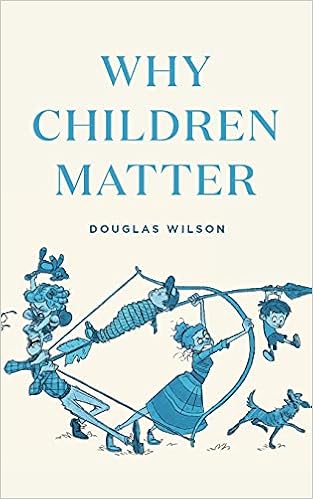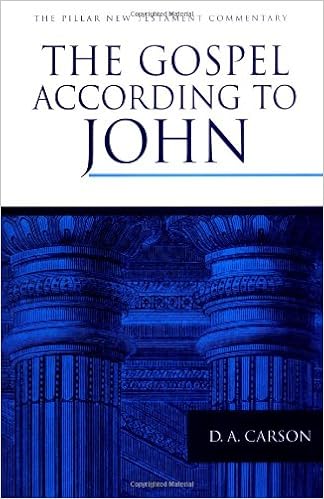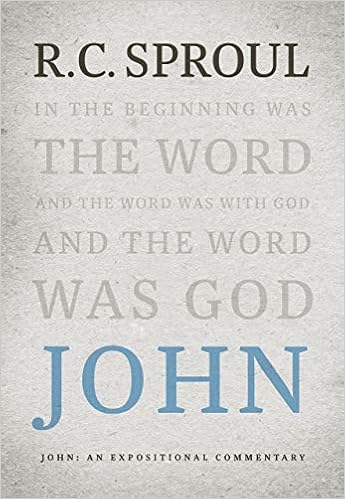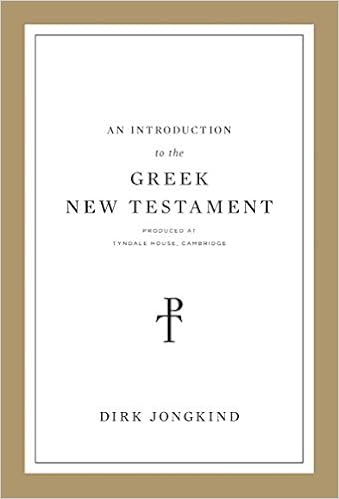How to Read More; Better
I love reading. It is my single favorite hobby to do in life. Those who know me best, will regularly hear me discussing something I am currently reading, or have recently read. As people have come to know me as an avid reader, I often hear the same sentiment- “I wish I read more”. I find myself regularly encouraging others in ways to grow as a reader, and in turn, read more than they do now. Reading is a joyful endeavor, and I love seeing people grow in their love and appreciation for good books. I will share below a number of different pieces of advice I find myself often sharing with others. I hope these serve you well – Tolle Lege!
Learn To Read
This first tip is not meant to be insulting, or belittling. The reality is, most people do not know how to read well. More than simply identifying words and rushing through pages, reading requires prolonged, critical engagement with thoughts and arguments. Every author is making an argument to you, and the reader needs to be able to engage with the authors flow of thought and the development of his/her argument. This takes time, and is a skill worth learning well. Reading is a very active experience. There are also different ways to read a book, at different levels of engagement. You can check out the famous book, How to Read a Book, by Mortimer Adler, to get you started.
Read What Interests You
Often, when somebody wants to grow as a reader, they think they need to begin by jumping into major works, on subjects they “ought” to be interested in. In my context, I meet individuals often who say they want to grow as a reader, and immediately think that means they should take on Herman Bavinck’s 4 volume Reformed Dogmatics. While such reading might work out for them, often, new readers would be best served starting small, and in areas where they find genuine interest in. Do you like baseball? Read a book on baseball you find intriguing. Do you think history is kind of cool? Go pick up a good book on a compelling era of history. There is no need to get going on a 1,500 page work by a major theologian if you’re going to drop out after 20 pages. Read fiction. Read good, compelling books on the christian life from the best authors (C.S. Lewis, Kevin DeYoung, etc). I constantly find myself reading books on Theology, American History, Winston Churchill, Economics, and the New England Patriots, because that drives my passion for reading. Reading books you are interested in will make you a better reader, develop more interests that you can read up on, and give you momentum for tackling bigger books.
Build Momentum with a Reading Snowball
There is something about finishing books which builds momentum. When you close the back cover on a book you’ve just spent days engaging with, you want to pick up the next one and keep going. I find it helpful, for newer readers to pick up smaller books, which they will be able to actually finish, rather than massive tomes which they may burn out on quickly. As you finish off books that are in the ~100 page range, it will encourage you, and equip you to take on books that closer to ~200 pages. As the momentum grows, your ability to take on more will build as well. I could never have imagined taking on books of 800+ pages when I was in college, but now, they don’t seem daunting to me (in fact, I love them!). Even if you don’t end up reading major works, finishing off books will help keep you in the flow of reading.
Quit Bad Books…But Not Too Fast
What happens if you find yourself reading a book, and it is just absolutely dull? We don’t want to waste too much of our precious time on bad books, and let’s be honest, there are a lot of bad books. One blogger made the sad, but true observation that we will not have time in our short lives to read everything we would like to. Therefore, we need to prioritize what we read, and be willing to move on from bad books that only waste time for good books. I learned a rule on when to quit bad books which I find helpful. The rule goes like this – Take 100, and subtract your age. That is how many pages you must read of a book before you can quit it. This keeps you from quitting too fast(some books just take time to get going) and allows you to quit before you’ve spent too much time on it. At the time of this writing, I now give every book 70 pages before I quit. This rule has paid off both ways, both in keeping my in good books which started slow, and allowing me to ditch bad books not worth my time.
Buy More Books
Some people think the best way to buy books, is only to buy them as you are able to read them. This may be very financially responsible, but it actually limits how many books you end up reading. Al Mohler, President of the Southern Baptist Theological Seminary, shared his recommendations with a group of pastors at a local conference. He said “if you wait to buy books for only when you’re going to read them, you’re going to miss out on a lot of good books”(paraphrase). I think he is right. If you we’re to tally up the most important books in my life, most of them were books I had owned for several years. Books picked up at a conference, in a store, on Amazon, and held until later on prove to be a very fruitful investment. Use discernment, yes, and practice good stewardship, but don’t hold back on picking up a book that has caught your eye simply because you won’t get to it for a while.
Read Together
Reading with others can provide good accountability for everyone involved. If you know that you will be meeting with friends to discuss a few chapters this week, you will be far more attentive to getting it done. Reading together also allows you to benefit from the insight of others. I started a book club at our church early on in my ministry, because I knew getting people together to share their insights into a book would be immensely helpful. People see things differently, and that can be helpful as we engage a good book.
Make a Plan & Share it with Friends
Like any other area of life, if we want to accomplish something, it helps to have a plan, and to have accountability. In 2022, I plan on reading 85 books, and in order to do that, I need to have a plan in place. My friends and I have made reading plans which we evaluate and revise towards the end of each year(my plan is a rolling 5 year plan). This maps out books I want to read over a few categories, and allows for a helpful tool along the way. I don’t view it so rigidly that it cannot be adjusted in the year, or that I can’t allow a few new books to break into the schedule. But having a plan on paper, that others know about, helps keep me on track, and be mindful of how many good books I have that I want to get to, as soon as I can.
Read Multiple Books at the Same Time
I hated this idea at first. For the longest time, I could not stand being in several books at the same time. I liked being able to conclude a book before beginning another. But this is very helpful, and allows you to read more. There are different types of books, and depending on your personality, you will read these different types of books, in different places and in different ways. I love reading theology, but I need my mind to be sharp and focused in order to read it well. If I wanted to read a Systematic Theology, right before bed, it may be difficult to retain much. That is not the case, for me, when it comes to books about sports, or fiction, or a few other genres which I can easily engage in a lighter way when my mind isn’t as fresh. Some books have long chapters, which require you to have lengthy reading sessions to move along in, as opposed to some books which can be reasonably engaged with in only a few minutes. Having a few books going at the same time allows for variety in what you read, and when you read it. Which leads to my next piece of advice…
Place Books All Around Your House
Tied to the previous point, we read different types of books, in different ways, but also in different places. If you know you like to read about sports, or fiction, or biography before bed, when you’re not as mentally sharp, have a few of them on your nightstand with a book light. Keep your Systematic Theology, perhaps, near your reading chair, where you can spend the appropriate time with it. I do a lot of my reading in the bath tub, so I always have books close by that I can engage when I want them. I keep books on current events, that I know I will want to get through quickly, on my kitchen table. Commentaries stay on my desk. You get the picture. Know where you like to read the different books you are currently in, and place them accordingly. You’ll be amazed how much reading you get done, simply because you were thoughtful in this one area.
Always Take A Book With You
While you’re busy putting books all around your home, do yourself a favor and put one by the front door. I never go anywhere, without a book. Instead of checking Facebook, or ESPN, or my email when I have a few free minutes waiting for my next meeting to show up, I read a book. Not all books can work for this context, so again, pick what works for you. But I find it very helpful to always have a book with me. You will find that there are many opportunities throughout the day, and week, where you can get some reading in, if you simply have a book with you.
Utilize Kindles & Audio Books
I’ll be the first one to admit, I fought these for a long, long time. I love having a physical book in my hand, and something about going digital, or audible, just felt wrong. But as I have grown as a reader, I have found that both of these methods can serve as helpful complements alongside regular, physical book reading. Having a Kindle with a backlight, allows you to take books where you might be able to otherwise. I can carry bigger volumes on a plane, or read while rocking my son to sleep at night. Using Audiobooks, likewise, allows me to listen to books in my day to day car driving time. I listen to very few podcasts these days, because I find it more worthwhile to engage in a book. Just driving to get groceries, to the coffee shop, or to get gas, you can finish off quite a few books using apps like Audible. Make the most of the margins, but supplementing using the technology we have available to us.
Go Down the Black Hole of Good Books
Maybe you’ve had this experience before- you are reading a few good books, and you realize, they all end up quoting the same resources. One good way to further your book reading, is to allow the good books you come across to helpfully guide you to the next ones you will enjoy. If you find many books citing J.C. Ryle’s Holiness, perhaps its worth the read? If you find the same few lines from Puritan John Owen, maybe it’s time to go read his stuff directly? If you are reading a book on American History, and the same scholar keeps being referenced, perhaps he has authored something that could pique your interest? If you pay attention to the timeless books which are often quoted in newer works, you will be able to discover some gems that will encourage more discovery.
Use Good Books as Kindling For Faith
One of the main reasons I read so much early on in my christian life, was because I had to. I started following Christ in 2010, and shortly thereafter began struggling with spiritual depression. As I fought through the fog that seemed to always be present in my life, I turned to good books to help my faith stay alive. Dane Ortlund, a fellow pastor in my Presbyter, wrote a very helpful article some time ago, and spoke regarding the importance of good books:
I would add a sixth word of counsel: read Richard Sibbes. Or John Bunyan. Or Thomas Goodwin. Or Jonathan Edwards. Or Spurgeon or Owen or Calvin or Whitefield or Charnock or Ryle or Packer or anyone whose heart was in heaven while his feet were on earth and who writes accordingly. When your soul is sullen, shock it to life with the defibrillator of old books.
Read good books, because they serve your faith, your joy, and keep your heart tethered to Christ.
Don’t Compare Yourself To Other Readers
We do not read to make ourselves feel good, or to be better than other members at church. We read because it’s good for our souls, and it serve our hearts delight. If you find yourself being discouraged because others read more than you, remember that people have different dispositions and preferences. Some people(me) are just nerdier than the rest, and find constant reading to be a joy. Comparison will not be able to sustain the desire to read more, only joy can. Recognize that the reason you should read more is because it is good, important, and healthy. We are justified by faith alone, not by pages read, so challenge yourself to read more this year than you did last, and give yourself grace when others seem to be moving quicker than you.
Best Books of 2021
Every year I read many good books, but some stand out above the rest. What follows is my annual recap of the best books I read during the previous year. New to this year’s post, I am also including a longer list of books, which didn’t make the top list this year, but were still enjoyable or helpful.
I didn’t get to as many books as I usually do in 2021, due to having our son, and many new developments for our family. Still, this year was an excellent year for books, as the ones I did read were very enjoyable.
As a disclaimer, not all of these books were published in 2021(though some of them were). I also am not putting the list in any particular order, they all stand out for particular reasons, and ranking them amongst one another is quite difficult. I also want to clarify that just because a book is listed here does not mean I agree with 100% with it. These are not all the books I read in 2021, but represent the most engaging and enjoyable.
Shepherding Child’s Heart by Tedd Tripp
This was one of the first books I read in 2021, and it was incredibly helpful. As I began reading on the topic of parenting, my main goal was to learn helpful practices for raising my son in the faith. Tripp’s classic work is an easy read, jam packed with practical, and biblical insights. I have recommended this to several people since reading it, and have already found myself reconsulting it. I pray that I embody the message of the book well, as I seek to shepherd James’ heart towards Christ and the Gospel.
Corporate Worship
After the initial lockdowns of the Covid-19 pandemic back in early 2020, many people were forced to rethink their understanding of what church is, and what Sunday’s are. I can think of no better resource, to give a robust, healthy vision of the importance, practice, and beauty of Sunday morning worship with the saints, then this book. Merker is engaging, biblical, and winsome, as he paints a picture for why it is so important to gather with God’s people on the Lord’s Day. This may be my favorite little 9marks volume, it really is that good!
Rejoice and Tremble
Perhaps my favorite book released in 2021. This was truly excellent, and impactful. Reeves picks up the concept of the Fear of the Lord, which is often confusing to many christians today. How is fear a good thing? What does it mean to fear God, in a biblical way? This fed my soul in profound ways, and it should be read by every christian who wishes to deepen their relationship with their God.
The Existence and Attributes of God by Stephen Charnock
This historic work has been a treat. I have been slowly working my way through Charnock, and the reputation is well deserved. Understanding who God is, and what he is like, through study of his attributes, is a much needed area of study for christians today. Getting to know just how awesome God really is, through feasting on rich, devotional doctrine, is good for the soul. I am thankful that God blessed the church through Charnock’s writing.
Confronting Injustice Without Compromising Truth by Thaddeus Williams

This probably is the most important book to come out in 2021. Williams has provided a resource for the church, which is truly invaluable. In a very timely fashion, this book takes head on the issue of social justice, and much of what we are seeing in the headlines around our country, and the world. Williams faithfully engages many of these issues, in ways which demonstrate the clear distinctions between the world’s approach, and the Bible’s. I think every christian in America needs to read this book, ASAP.
Holiness by J.C. Ryle
Re-reading this in 2021 was much needed. Ryle’s historic work is definitely in my all time top 3 books ever (It may just be my all-time favorite, ever!). This book pierces the soul with biblically rich, convicting evaluation, pressing in to a need for greater holiness. Since holiness is often left undiscussed in our cultural moment, I find it helpful to be reading on it regularly. I will return to Ryle again and again, as I seek to cultivate a ever deepening desire for true holiness. If you haven’t read this classic work, it would be a great goal to do so in 2022.
Men and Women In The Church by Kevin DeYoung
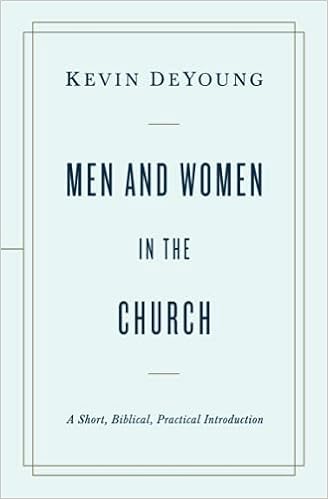
This is a rework of DeYoung’s earlier work Freedom in Boundaries, which is no longer in print. Although there is some overlap of the material in terms of exegesis, most of the book is redone, and quite a bit has been added to it in terms of application. The church in our world is constantly needing faithful guidance regarding scriptural understandings of gender roles in the life of the church. This short book is accessible, helpful, and winsomely written. I would have no concerns handing this book to a congregant, even if I knew they disagreed with portions of it. His display of the different levels in which we draw guidance from scripture, is immensely helpful. Pastors, church leaders, and members should all read and refresh themselves on what it means to live into our God given design, complementing one another in our roles.
Why Children Matter by Doug Wilson
This was one of my favorite reads in the area of parenting over the past year. It is short, and gives one of the most helpful frameworks for understanding discipline, parenting, and family life that I have come across. Doug and his wife also have several hour long Q&A videos on Youtube which are immensely helpful. My wife and I both read this, and have really enjoyed the discussions sparked by it. We have already begun planning what it looks like to implement it’s insights into our own family’s life, and we are very thankful for it.
With All Your Heart by Craig Troxel
I am very thankful to Troxel for writing this book. Looking at how we orient our entire lives (Mind, Desire, and Will) towards Christ was refreshing for my soul. This book was convicting in so many areas, but encouraging and inspiring in even more. I walked away refreshed in the love of Christ, and renewed in my soul to follow him in all that I am. Woven throughout this book are helpful applications, biblical insights, and rich reformed theology. A treat to be savored! Read this during your rest on the Lord’s Day over a few weeks.
Slaying Leviathan by Glenn Sunshine
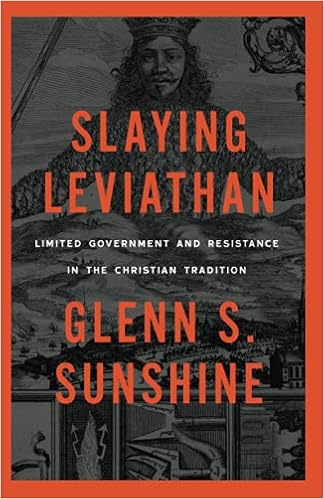
In 2020, Covid-19 changed everything. Many assumed that changing over to a new year, 2021, would fix most of our problems. This turned out, shockingly, to be dead wrong. As we have gone through this pivotal moment, we have seen christians needing to think through the topic of resistance to local governments in ways which we have never quite seen before. We have both sides arguing voraciously, one for unquestioned submission to the government appealing to Romans 13, and the other advocating for resistance to government intrusion into church and family matters, no matter how trivial they may seem. Most, however, on both sides, are arguing ignorant of much of the history that came before them. This little book is such a help, tracing through how christians have thought about the issue of government, resistance, and how we can best think about these things today. Buy this book, get a picture of the historic landscape, and then continue to dive deeper into reformed resistance theory, you’re going to need it!
Providence by John Piper

This has been called Piper’s Magnum Opus, and for good reason. This massive work, both in size (~700pgs) and scope, is an excellent representation of John Piper’s ministry. I loved devouring this over the course of the year. In my life and ministry, the doctrine of providence has proven to be sweet, truthful rebar support for my soul. I commend it highly, and anytime I references books written by Piper, this will be among the first named.
R.C. Sproul a Life by Stephen Nichols
I loved R.C. Sproul and I miss him tremendously. This biography, informed by a deep personal friendship between Nichols and the Sprouls, is loaded with hilarious stories, insights into the behind the scene workings of Ligonier, and the overall character of a tremendous man. Reading this was so much fun, as I was so eager to learn even more about the man who’s minister has had a profound impact on my life, and so many others.
Hole in Our Holiness by Kevin DeYoung
This book isn’t new, but people should know about it. DeYoung wrote this book, almost like a smaller, more accessible version of Ryle’s classic work, to showcase the church’s shortcomings on the doctrine of holiness. This book convicted me, of what I watch, to what I say, to how I obey God’s word, and why. You should read this book, and then go read Ryle. Your faith, and life, will never be the same.
Some other notable books I read in 2021:
Lord of the Rings: The Fellowship of the Ring
What Does God Want From Us Anyway by Mark Dever
The Expulsive Power of a New Affection by Thomas Chalmers
Bavinck: A Critical Biography by James Eglinton
Encouragement for the Depressed by Charles Spurgeon
Reformed Resurgence by Brad Vermurlen
Praying with Paul by D.A. Carson
An Introduction to the Greek New Testament by Dirk Jongkind
Shepherd Leader in the Home by Timothy Witmer
Master and Apprentice by Claudia Gray
The Gatekeepers by Chris Whipple
Wisdom Pyramid by Brett McCracken
With A Mighty Triumph by Rhett Dodson
Hope in Times of Fear by Tim Keller
The Pastor as Counselor by David Powlison
Call The Sabbath A Delight by Walter Chantry
Funding Your Ministry by Scott Morton
Small Preaching by Jonathan Pennington
Family Discipleship by Matt Chandler
How Should Men Lead Their Families? by Joel Beeke
Covenantal Baptism by Jason Helopoulos
Redeeming Your Time by Jordan Raynor
Questioning Evangelism by Randy Newman
The New Reformation by Shai Linne
Rediscover Church by Collin Hansen
God, Technology, and The Christian Life by Tony Reinke
Power in the Pulpit by Henry Clay Fish
The Priority of Preaching by John Cheeseman
Reading the Bible and Praying in Public by Stuart Olyott
A Map of American Presbyterianism
When I was studying for my ordination exams in the PCA, one field of study which took up much of my time was the history of Presbyterianism in America. I used several different resources, but one of the most helpful was a graph I came upon that tries it’s best to depict the several different presbyterian denominations, and how they relate to one another over history. This is the diagram:
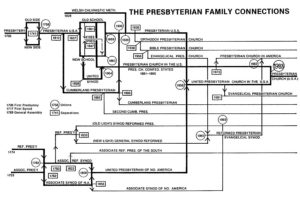
Recently, there have been a few different attempts to represent the same information via an updated graph. Admittedly, the older graph isn’t the easiest thing to look at! I decided, with some inspiration from a fellow PCA pastor, to go ahead and remake the older graph, but using the design of the London Underground rail system. I’ll post it below for anyone who could benefit from it:
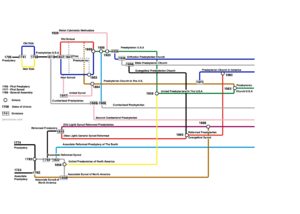
Book Briefs – April
Each month I like to recap the books I have read which were particularly beneficial. Here are my favorites from April:
1. Confronting Injustice Without Compromising Truth
Williams’ new book on Social Justice is one of my favorite reads in a long time. In our cultural moment, having biblical, balanced, and persuasive answers to the many issues encompassed by the “Social Justice” movement, is essential. This book is the best for equipping you to understand the major issues at play, how to think through them in a balanced, and biblical way, and respond winsomely towards those who would disagree with you. I rarely give 5 star ratings for books (less than 10% of books read) — this book is 5 stars, and a must read.
2. What Does God Want of Us Anyway?

This small, short book by Dever is a true gem. Admittedly, I did not know it existed until recently, when Dever discussed it on his podcast Pastor’s Talk. This little book is an overview of the Bible, and is really helpful at giving someone a 10,000′ view of Scripture. I’ll use this with guys that I want to disciple, and in Sunday school classes where we study Scripture. Dever both gives the message of the Bible, and an intro to the different component. He even gives a sentence description of each book of the Bible! Incredibly helpful.
3. The Gatekeepers (Audiobook)

I am fascinated by anything related to Washington D.C., The Presidency, US Government, etc. While current political issues are exhausting, I find the history of our government intriguing. This book walks through a history of the White House, looking through the lens of the Chief’s of Staff, from Nixon to Obama. I found The Gatekeepers to be great history, and very entertaining. Important note: One should be aware that this book has lot of swear words in it, as it recounts the conversations which took place in closed door meetings.
4. Fault Lines

I have been studying up on Postmodernism, Critical Theory, and Social Justice the past year. Many books have been helpful, some more so than others. Voddie’s new book is in the “more than others” category. While there are books I prefer over this one (See #1 on this list), this book is very helpful. Voddie sees the division taking place in the church, and seeks to apply Scripture and reason to many of the issues we are wrestling with both in the church, and as a culture. Read Williams’ book first, then get this one.
Book Briefs – March
Each month I like to recap the books I have read which were particularly beneficial. Here are my favorites from March:
1 . Rejoice and Tremble
This is Reeves’ best work. I have always been a fan of his writing, but Rejoice and Tremble is incredibly rich, theologically profound, and incredibly pastoral. I stayed up all night finishing it, and would recommend it as highly as I can to anyone reading this. What does it mean to Fear God? Take and Read!
2. With a Mighty Triumph!
I was given an advanced copy of Dodson’s new book on the resurrection. This short little book is a perfect balance between rich exegesis, and helpful application. Walking through 1 Corinthians 15, Dodson helpfully explains the beauty, importance, and relevance of the resurrection of Christ for our lives today. This is my new go to book on the resurrection.
3. Wisdom Pyramid
I found The Wisdom Pyramid to be immensely helpful. I wish everyone in the church would read this, and reorganize how it is they pursue wisdom in a digital age. Far less internet/social media, far more scripture, church, and healthier sources. Restructure your knowledge and wisdom diets by taking heed of the wisdom shared in this book.
4. Hope in Times of Fear
Anything Keller writes, I buy it and read it. This book, which was originally meant to be a companion to his book Hidden Christmas, is focused on Easter and the resurrection. Writing during his own personal struggle with cancer, Keller gives plenty of helpful insights and wonderful theological truths concerning life amidst fearful times. This book could’ve been a lot shorter, and there were portions which didn’t seem to fit all that well, but all in all, I am thankful anytime I can read Keller.
5. Men and Women in the Church
DeYoung’s new book is a remake of his older work Freedom and Boundaries. I really enjoyed this book, and it will be a go to resource for me for church members seeking to grow in their understanding of complementarianism. DeYoung shows forth the biblical mandate, and the beautiful application of complementarity, in accessible language and categories. Gender roles will surely be a hot topic for many years to come in the US, christians, and churches would do well to read and study this book.
Book Review: With A Mighty Triumph! by Rhett Dodson

Pastor Dodson has written another incredibly helpful resource for christians today. All of Dodson’s works are biblically saturated, and easily accessible.
This short book on the doctrine of the resurrection, is an exposition of 1 Corinthians 15. Broken into 6 small, but meaty chapters, the book seeks to both explain, and apply the truths contained in Paul’s pivotal chapter to the Corinthian church. Dodson both is helpful in his careful explanation and tracing of Paul’s logic, and also incredibly pastoral as he applies that truth to the average christian life.
It is quite shocking, actually, to see so few, excellent books out there on the resurrection. This will be my go to book for my congregants, as it is short enough that anyone can read engage with it, but biblically and theologically rich so as to serve all readers immensely well.
I cannot recommend this highly enough. Buy it, read it, and share it with a brother or sister you know.
A Balanced Diet for Wisdom – Book Review of The Wisdom Pyramid by Brett McCracken
Have you found yourself feeling overrun by the never ending news cycle? You’re told every day of news, fake news, conspiracy theories, leftist propaganda, etc. How can we begin to get a handle on all of this data, and respond in a healthy way? In a world overloaded with information, where is wisdom to be found?
I am very thankful for Brett McCracken’s new book The Wisdom Pyramid, and it’s aim to help us balance our information diet, so that we may grow in wisdom. In a world facing an overload of information(often times biased information), and wisdom seemingly so hard to discern at times, this book is exactly what the doctor ordered.
Diagnosing Our Problem – Information Overload
Many of us don’t need help diagnosing the issue, because we feel it everyday. We hear hot takes on the news, on our social media pages, in our group text chains, on our podcasts, and in our daily interactions with our neighbors. There is so much going on, and everyone has an opinion about it. How in the world are we to manage a never ending stream of information? The answer is, we can’t, yet we still try to. McCracken helpfully diagnoses our problem: “Just as too much food makes a body sick, too much information makes the soul sick. Information gluttony is a real problem…”(pg 28)
This opens us up to all kinds of error. As McCracken notes, our never ceasing drive to consume information and stay relevant on what is happening right now and respond, is a recipe for disaster:
Further, we consumers are often eager to share things on the spot. Our quick-draw posture on social media is often “post first, think later” (if we think at all). This is disastrous— not only because it makes us easy to manipulate, but also because it erodes our credibility and can do great harm to others. (pg 46-47)
If we are overly fixated on being “first” in reposting, liking, or sharing novel content, we shouldn’t be surprised when we are often wrong, and our souls feel like they’re on a never ending hamster wheel. We need better approaches to how we should take in truth, discern it, and respond to it. Just as our bodies suffer when we binge on candy and junk food, taking in the information equivalent of sour patch kids and milk duds will leave our souls feeling terrible and malnourished.
Plotting Our Path Forward – A Balanced Diet of Truth
What is our path forward in a world marked by such an unbalanced truth-diet? McCracken lays out 6 ways we can take in truth, and ranks them in the order we should consume the most & are most necessary for our lives. The order goes:
- Bible
- Church
- Nature
- Books
- Beauty
- The Internet
The first 2, he recommends, are the only ones truly necessary (Bible & Church pg 68) and the other 4 may be helpful after we have appropriately consumed the others. What should strike us is how often we invert this list. How many of us begin primarily with the internet (just Google it!) instead of first searching the Scriptures, or bringing it to the church?
McCracken is clear that this approach is not meant to be exhaustive in every way, but rather, to provide a helpful balance to our everyday life, and habit formation (pg 68-69). As he lays out each section, however, one can’t help but feel that this truly does provide a better way than what is so intuitive to most living in the 21st century. Just about any issue we face could be well informed by following this balanced approach. When looking at sexuality, say, we could easily be put right by searching the scriptures and hearing from the church, but consider too how nature itself is vitally important. As McCracken argues, the body has authority in itself (pg 110-113), and to deny that in favor of the most recent progressive blog post, would be to lose wisdom in favor of a cheap alternative.
Any christian would be wise to look at this list (or rather, pyramid), and evaluate how they engage with truth in light of it. Is our diet mostly junk food, taking in the less important and often expendable sources of information? Are we being served well by the sources we go to? Perhaps we could all use a more balanced diet. Maybe it would allow our hearts to rest in time tested wisdom, instead of hurriedly trying to determine how we should post about the most recent tabloid issue. Maybe our souls would begin to feel refreshed, our lives suddenly less hectic, and our witness more believable.
Living Life Wisely
I found myself challenged as I read McCracken’s insightful engagement on this issue. I recently decided to delete some of my social media accounts, and the others I removed their apps from my phone’s home screen. I want to make it far more natural for me to be slow in going to the internet, social media, and other fast hitting sources, and be far more inclined to meditating on the scriptures, thoughtful conversations, deep reflections on truth in the world, and what wisdom I have gained from other’s insightful engagement on issues. I know this will not always be perfect in my life, but I am hoping it to be far more balanced moving forward than it has been in the past.
I think christians tend to be far more shaped by their culture than they tend to realize. Living in the 21st century, we have many blessings that no other generation before us had, and yet, that comes with a great cost. If we are going to live in an era of information overload, we must be disciplined in our discernment of what constitutes a healthy diet, and balance it appropriately according to God ordained, time tested means. I would recommend The Wisdom Pyramid for any christian wanting to grow in this area of their life, having realized their need for a better approach.
*I received a free review copy of The Wisdom Pyramid from Crossway. This did not in any way impact my engagement with the book or the substance of this review.
Commentaries on John
As of this week, our church will finish our current sermon series in John, entitled “Life in His Name”. We have spent the past 1.5 years working through John’s gospel account, and it has been a blessing. As I am concluding my final sermon in John, I thought it might be helpful to review the commentaries I have read through over the past year+, and identify those that were particularly helpful.
Most Helpful:
1. The Gospel according to John by D.A. Carson (Pillar NT)
This was by far the most helpful commentary during my time in John. It may be, in fact, the single most helpful commentary I have ever read on any book in the Bible. Carson provides a helpful balance of critical engagement with other academic voices, language studies, and pastoral application. He is particularly helpful threading together the many themes in John which are crucial to understand in order to preach the book effectively. If I could only have one commentary, it would be this one.
2. John-Acts by Jim Hamilton (ESV Expository Commentary)
Crossway’s new ESV Expository Commentary set is fantastic. It provides helpful insight into the original languages, as well as text structure, all the while driving towards pastoral application and christian response. The format is well laid out, and the chapters are short, while packing in a lot of good content. This set is quickly becoming one of my favorites, and I eagerly await more volumes to be produced. The pastoral response sections were very helpful during my time in John.
3. Let’s Study John by Mark Johnston (Let’s Study ____ by Banner of Truth)
The Let’s Study series by Banner of Truth is often overlooked, and incredibly underrated. This is designed for lay people, and it is by far the most accessible volume I read during my time in John. It’s accessibility does not mean, however, that it is lacking in theological or textual depth. In a few short pages, each chapter helpfully breaks down the structure of a passage, explains it, and applies it practically. I found myself often coming to this commentary at the end of my sermon prep, only to find that Johnston and I had nearly the same outline for the text! If you are studying John, or any other book devotionally, this series is for you.
Honorable Mentions:
1. John by RC Sproul
R.C.’s commentaries are always theologically rich. This would be another option for anyone seeking to read through John devotionally, as R.C. does a great job clarifying key theological concepts and themes in the book.
2. John by John Calvin (Calvin Commentaries)
Calvin’s commentaries will always be on my “favorites” lists. Textual, insightful, and devotional.
3. John vols 1 + 2 by Richard Phillips (Reformed Expository Commentary)
Phillips’ 2 volume set on John was one of the more helpful resources from the explicitly Reformed perspective. In particular, I found his pastoral tone very helpful as I thought through applications for my own congregation.
Additional commentaries:
John by John MacArthur (MacArthur New Testament Commentary)
The Gospel of John by J. Ramsey Michales (NICNT)
John by Gary M Burge (The NIV Application Commentary)
John by R. Kent Hughes (Peaching the Word)
John by Colin Kruse (Tyndale NT)
John for You by Josh Moody (Bible For You series)
Book Briefs – February
Here are some of the best books I read this past month
Corporate Worship by Matt Merker
This recent addition to the 9Marks series is one of my favorites yet. Merker helpfully lays out a biblical understanding of corporate worship, and how we are to faithfully engage in it. This book is theologically rich, and incredibly applicable. I plan on using this book for our church’s book club in the near future, as I believe it is the most helpful resource out there for christians looking to understand what our Sunday gathering really is about.
Encouragement for the Depressed by Charles Spurgeon
This tiny book combines two classic works of Spurgeon. Encouragement for the Depressed is a helpful treatise on those who are downcast and struggling to find joy. The companion piece aimed at pastors specifically, The Minister’s Fainting Fit, is a classic, which should be read by every pastor. I was deeply encouraged as I re-read this helpful, and practical aid to understanding the trials that come during vocational ministry.
Bavinck: A Critical Biography by James Eglinton
I wanted to read through a biography of Bavinck, before I plan on tackling his 4 volume Reformed Dogmatics later this year. Eglinton’s biography was recently released and is excellent. It is a “critical” commentary, which means it is a bit more focused on a scholarly account of the man. Still, I found this helpful to get to know Bavinck as a person, to better serve my engagement with his theology.
Reformed Resurgence by Brad Vermurlen
How do we understand the recent resurgence of Calvinism in our day? Vermurlen spent his dissertation researching this question, and came up with some insightful results. Showing how celebrity power propelled the Calvinism movement into prominent position, Vermurlen also shows how the movement is poised to endure through strong institutions and a robust, younger following that is committed to Reformed theology. This book was a ton of fun to read, and though I may not agree with every conclusion or opinion he has, I think he did an excellent job representing different players in the evangelical world over the past couple of decades.
An Introduction to the Greek NT by Tyndale House by Dirk Jongkind
As I have been doing research, which ultimately led me to get on board with the new Greek NT from Tyndale House, I found myself picking this little book up for further insight into their translation process. This small companion to their new Greek NT was very helpful to see their approach to translation and I was really pleased by the depth of transparency given by Jongkind into how decisions were made. If you’re interested in the new NT by Tyndale House(as I am!) this is a good book to start with.
Book Briefs – January
Every month or so I like to give a snapshot of some of the books I’ve read over the past few weeks. These might be particularly helpful, interesting, or important otherwise. With each book, I give a bit more info, and potentially any words of concern as well. That being said, on to the books!
Hole in Our Holiness by Kevin DeYoung

This book has sat on my shelf for quite some time now, and I am a little embarrassed it took me this long to read it. DeYoung provides a very accessible, and helpful resource for those desiring to have a more complete picture of what holiness is and how central it is to our lives. I strongly recommend this book.
Shepherding a Child’s Heart by Tedd Tripp
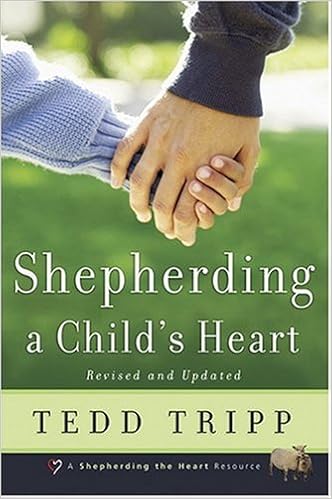
Having received the wonderful news that Kristi and I will be having a child later this year, I have begun reading several parenting books. This one was highly reviewed by pastors and friends I trust, and it did not disappoint. Very biblical, very practical, this book has many strengths and very few, if any, weaknesses. If you are a parent, or serve children in any formal way, this is a great tool.
Expulsive Power of a New Affection by Thomas Chalmers
![The Expulsive Power of a New Affection (Crossway Short Classics) by [Thomas Chalmers, John Piper]](https://m.media-amazon.com/images/I/51uk2hFbhiL.jpg)
This short sermon by Chalmers is a classic. More of a discussion on the topic of having new, primary affections for Christ, rather than a true exposition, this small book packs a lot of power. You can read this in just a couple of hours and your soul would be well served by it.
Praying with Paul by D.A. Carson

Dr. Carson walks through Paul’s prayers in the New Testament and shows their foundations, content, and application. This book is a really helpful way to better understand the prayers of Paul, and see how that may change your own prayer life. The chapter on Paul’s prayer in Ephesians 3 is worth the price of the book by itself.
1776 by David McCullough (Audiobook)

I have been listening to 1776 as an audiobook in the car when I drive just about anywhere. McCullough does an excellent job at balancing the sheer volume of information and detail he gives as a historian, with his skillful ability to tell a compelling story. It is great getting to hear some of the foundational moments in our nation’s history. Both entertaining and insightful.
Providence by John Piper

I was able to secure the digital version of John Piper’s forthcoming book, and I must say, so far it is fantastic. I am only a few chapters in, but thus far it has been incredibly biblical, clear, and edifying. I will give further comments once I finish the book, but for now, it seems that this may be Piper’s best work yet.





